#College protests
Explore tagged Tumblr posts
Text

Hind Rajab was a 5 year old girl in Gaza who was killed while she hid alone in a car, along with the paramedics who tried to rescue her. Yesterday students at Columbia seized the administration building and renamed it in her honor.
Gadzooks Bazooka Instagram: gadzooks_bazooka
Remembering #HindRajab & children in #Gaza: This is what the mother of the child, Hind Rajab . https://tmblr.co/ZTeZMyfB_GHeeu00
Update (July, 2024)
UPDATE FROM
@sunnydice: (and please don't forget Layan Hamadeh , her 15 yr old cousin who was trapped with her or Yusuf Zino and Ahmed Al-Madhoun who bravely volunteered to try to save hind and were murdered by the IOF )
DrSonnet — هذا ما قالته والدة الطفلة هند رجب عندما سمعت بخبر... (tumblr.com)
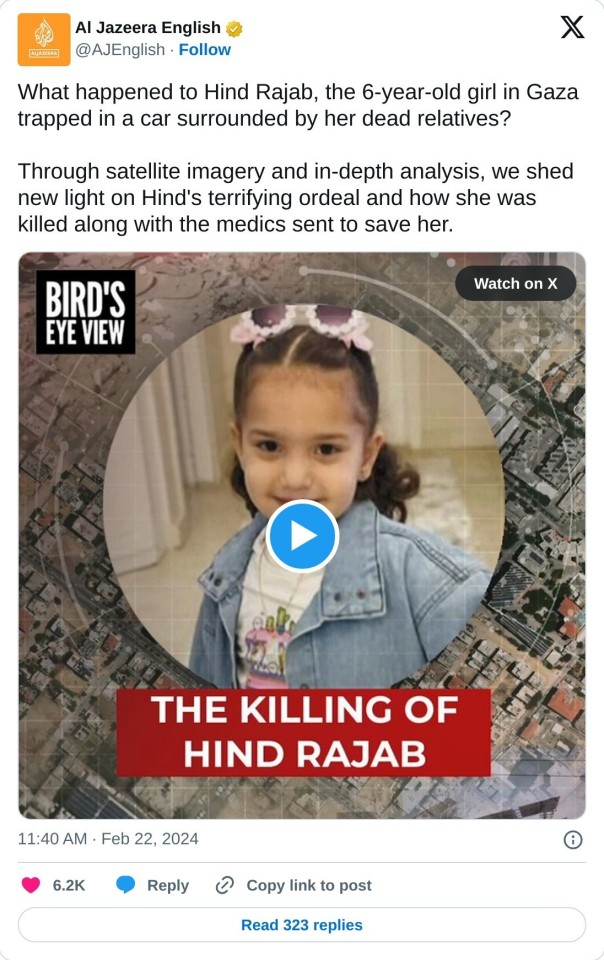
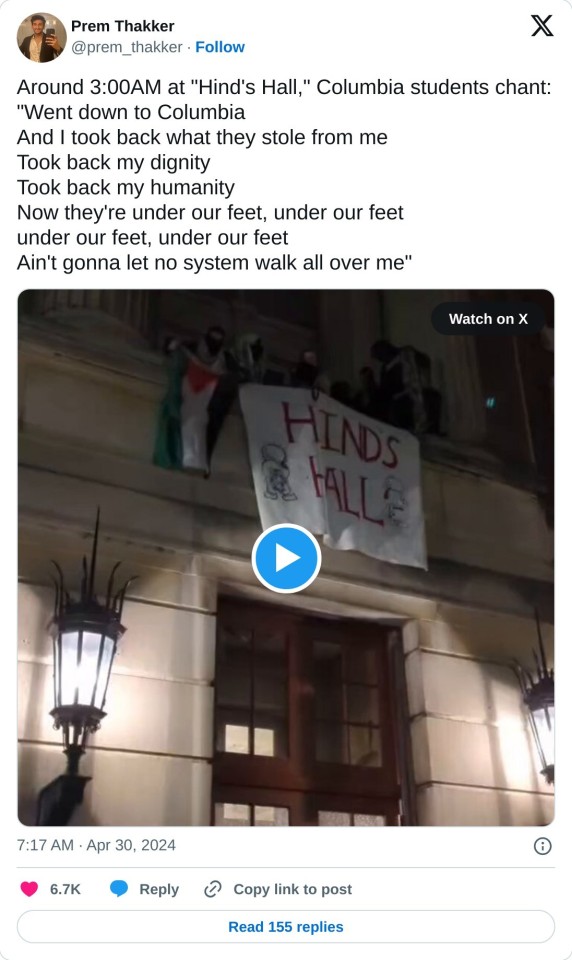
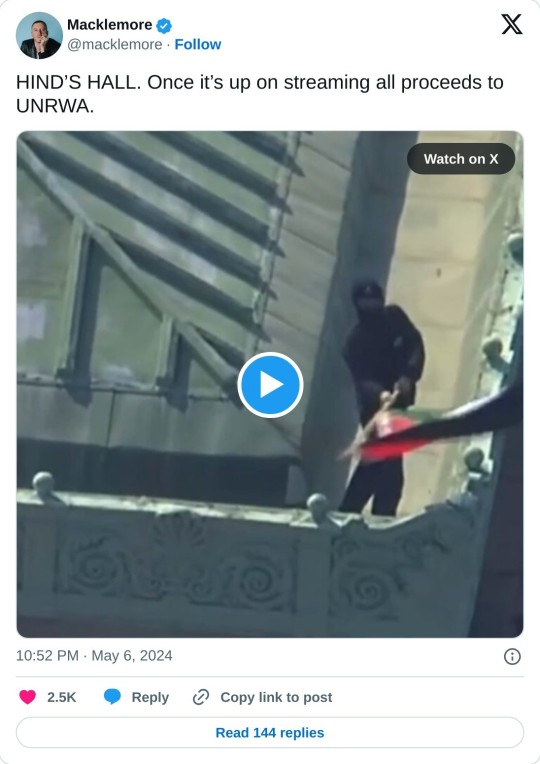
#هند رجب#جامعة كولومبيا#hind rajab#genocide#gaza#student protest#college protests#harvard#jerusalem#tel aviv#Israel#BDS#WAR ON GAZA#free palestine#PALESTINE NEWS#UCLA#nyc#NYPD#friday#Good Friday#FREE#art#artist#contemporary art#history#world history#columbia university#protests#Palestine#WAR
29K notes
·
View notes
Text
It is vital that we keep the efforts of so many students across the United States from going to waste. We need to keep the momentum going and ensure that news of the cruelty happening to the people of Palestine is not ignored or suppressed.
Despite what many news outlets may have you believe, what is happening in our world is not minor in the slightest. It is a genocide that is happening before our eyes, day after day. Do not forget the administrative responses these colleges have given to the act of bringing attention this inhumanity. This is history happening now, and these colleges are on the wrong side of it.
These students are calling to divest college funds from Israel. Do not let the media warp their efforts and paint them as an antisemitic mob. Do not let those opposing these demonstrations hide behind claims of antisemitism to justify their actions. This is about stopping human suffering, and to believe anything different is willful ignorance.
#college protests#usc#ut austin#brown university#columbia university#mit#csu Humboldt#free palestine#free gaza#Palestine#gaza#israel#activism#important
3K notes
·
View notes
Text
“I had a Zionist grandmother who grew up, she grew up in Poland, she was supposed to go to Israel to study. Her father had paid for her for the first year of tuition. And then in 1939, when she was in her last year of high school, Germany and the Soviet Union invaded Poland.
She ended up for a couple of years in the Soviet-occupied part of Poland, which was how she ended up in Moscow. And by the time Germany occupied all of Poland. So then she spent the rest of her life living in Moscow.
And 45 years after the end of the war, dreaming of being able to go to Israel, but not being able to because she was now stuck in the Soviet Union. And so I think I was very infected by, infected in a non-derogatory sense, by my grandmother's dream of Israel. And I had my own dream of Israel growing up as a, as a Jewish kid who was bullied and beaten up and teased.
I just wanted to live in a country that, that was majority Jewish. I could not understand why my parents would want to go to the United States and live in another country where Jews are in the minority. My parents on the other hand just didn't want to be Jewish.
Like their only experience of being Jewish was being systematically discriminated against. They were both born during the Second World War, so they were second generation, utterly non-religious and separated from any Jewish tradition, except the tradition of being a targeted minority. So they just, they just wanted to go somewhere where they wouldn't be Jewish.
And so when I was 15, a year after we moved to the United States, I actually went to Israel planning to stay there and didn't. For a variety of reasons, but one of them was being confronted with, with what I found at the age of 15, a shockingly racist society.
So the first time I went to Israel was when I was 15, it was 1982. And then there was like an 18, 17 or 18 year gap.
And I started traveling to Israel regularly from 1999, 2000. And the first time I went back was to actually complete the research on the book about my grandmother's. So it's been a good 25 years that I've been coming back.
And I think Israel has undergone a lot of changes in that time. But no, I don't think that like the kind of Ashkenazi Sephardic racism that shocked me in 1982 has found subtler expressions. But politics of settlement have only been exacerbated.
And I still find them extremely painful to observe, especially because some of my beloved relatives are settlers.
I did visit them this last time I was in Israel, because I really wanted to see what it looked like for them.
I was compelled to go visit them because of a Facebook post that my cousin made. And just to give you an idea, I really hold these people very, very dear. But for years, I would go to Israel, Palestine and not tell them that I was there, because I kind of couldn't face them.
So it's been a number of years since I last saw them, a number of years since I went to that settlement. But my cousin had posted something on Facebook. It was a picture of her son playing the violin.
And she wrote, in one of the houses where they stayed in Gaza, there was a violin. He played for his soldiers and then put the violin back. And I found that post-heart-rending and eye-opening, the picture of him playing the violin was not from Gaza.
It was from earlier, but he had apparently told her about playing the violin in Gaza. And obviously she was worried about her son serving in Gaza and so she's posting about it. And she wants to assert that he is a good boy.
But also, entirely missing from that post and from her world view is that somebody lived in that house in Gaza. That violin belonged to somebody. Like, it was such an extraordinary example of the blindness that we were talking about a little bit earlier that I wanted to go visit them and kind of engage with that blindness more.
And I got a really good dose of blindness to the point where, and we had this incredible moment when we went walking around the settlement after Shabbat lunch. And we sort of got to this hilltop where there's a swing and there's a little free library.
And we're looking out on a Palestinian village. And I said, what are we looking at, to my cousin? And she was trying to get her bearings.
And she said, where are we looking? And she named another settlement, which was kind of, which was not on our line of sight. It was like this literal example of looking at an actual Palestinian village that she drives past every day.
And before the village was sealed off after October 7th, she used to get gas there. And she knows it exists. But somehow she, also it also doesn't enter her geography.
It is nameless.”
—Masha Gessen, the descendant of Holocaust survivors, discusses the dehumanization of Palestinians (part 2 of 3)
#politics#palestine#israel#masha gessen#antisemitism#anti zionisim#anti zionism ≠ antisemitism#weaponized antisemitism#weaponized zionism#hasbara#israeli propaganda#identity politics#weaponized identity politics#🇵🇸#idpol#israel is a terrorist state#israel is an apartheid state#college protests#dehumanization#settler violence#settler colonialism
2K notes
·
View notes
Text
This black student sings gospel (which originated from slaves) as she's carried away by black policemen, who likely heard the same song in church, but practice the tradition handed down from slave patrols. What a sight to behold.
This student is not showing us a cause for hope and celebration, but rather they unyielding determination and spirit activists have. This struggle nay not cause what we want immediately, but it is still our struggle. It is our destiny, as humans, to struggle. And struggle we will, until change is seen.
1K notes
·
View notes
Text
Look you can say that the students with Hezbollah flags quoting hitler are "not part of your movement" all you want but they ARE in fact sitting at the protests long enough for people to take pictures of them and post them on the internet without getting told to leave so ??????
#antisemitism#college protests#israel#'antisemites are not welcome' okay then tell them to gtfo lmao
657 notes
·
View notes
Text
I really want everyone to stop and watch this video.
Yesterday, on 10.7 - the one year anniversary of the deadliest day for Jews since the holocaust, pro-Hamas students at my alma mater, The Claremont Colleges, engaged in a protest that resulted in the students who were attending class ESCAPING through the window.
Not only did they disrupt classes but they rendered the building so vandalized, the electronics so cut up that it is unusable for at least the rest of the semester. I want to empathize, STUDENTS BROUGHT KNIVES TO A PROTEST - they sliced a projector screen in half.
Oh, they also shoved a professor and kept him trapped in the building.
this behavior is unacceptable, abhorrent and obscene.
For anyone who says "oh this is free speech," it's absolutely fucking not
#antisemitism#leftist hypocrisy#college protests#I did email the school being like “hey I'm never donating and this is why”
389 notes
·
View notes
Text
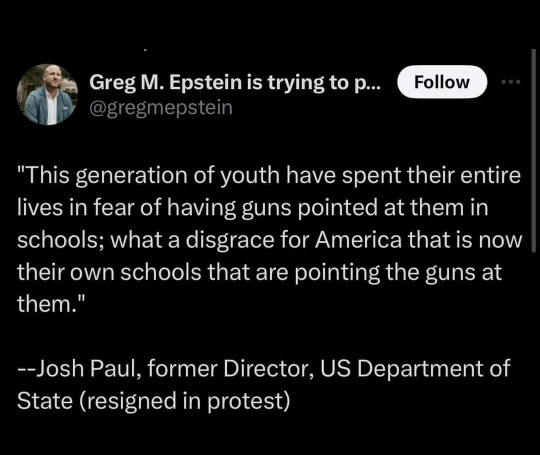
553 notes
·
View notes
Text
Something I think is so important to acknowledge with the Columbia university protests is that these students were the class of 2020
the seniors, passing up on their college graduation, where once high schoolers denied their prom & graduation due to a global pandemic that the American government scoffed at.
They are not children protesting a war they "don't understand", these are students at one of the most prestigious academic institutions in the world, they are well educated young adults looking back at the milestones that have been taken from them and willingly letting go of their second chance, because that is how strongly they believe in this cause
#free palestine#columbia university#via rambles#politics#anti zionisim#pro palestine#anti israel#free gaza#college protests#class of 2024
299 notes
·
View notes
Text
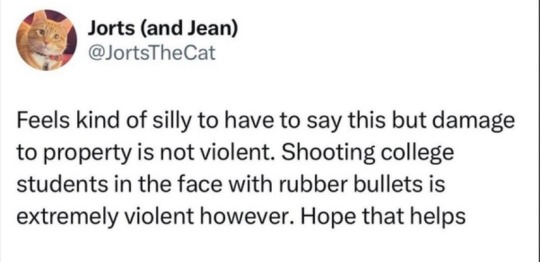
#this is why we can't have nice things#student protests#student life#student causes#violent protests#peaceful protests#protests#protection#protest#college#college protests#gaza protests#free gaza#gaza strip#gaza genocide#woke is wonderful#lies and the lying liars who tell them#gazaunderattack#save gaza#gaza#news on gaza#war on gaza#stand with gaza#gazaunderfire#student protests for Gaza#student protests for Palestinians#violence gets noticed#the violence is killing me#police violence#gun violence
168 notes
·
View notes
Text
"In fact, “normies” like Hovater are just as dangerous, if not more so, than the neo-Nazi skinheads and criminals who have up until now been the face of the far-right extremist movement. Thugs carrying guns and beating people up in alleys may evoke more fear, but historically they are outliers. Incidents of mass violence like the Holocaust, Rwandan Tutsi Genocide and the Cambodian Genocide begin when average citizens buy into racist ideology and do the work of turning a society against a group of people. And those average citizens do have regular jobs and careers. They may even have friends of different racial backgrounds, and they may be loving parents.
Testimonies of genocide survivors tell us, time and time again, of the once friendly neighbors who turned in their Jewish acquaintances to the Gestapo. The classmates and teachers who taunted students with racist chants. The manifestos shouted on the radio and printed in newspapers. All the people responsible for these acts were “normies.” Genocide prevention depends on recognizing that future perpetrators are not a special breed of evil: they are normal people who, without proper intervention, can be easily persuaded to become more and more open about their hate until eventually they resort to violence."
the only defense to becoming a monster, even if you don't look or recognize you are becoming one, is to learn about the world and the people in it. seeing in black and white, perfect good and perfect evil, misses the complexity of life.
stop trying to moralize acting shitty to strangers and friends by covering it in coded language and excuses.
118 notes
·
View notes
Text
Just described the situation of college campuses in the US to one of my campers who made Aliyah from Belarus.
She goes- oh, sounds like how people treat Jews in Belarus.
I think it would be good if the United States could stop resembling Belarus please.
79 notes
·
View notes
Text
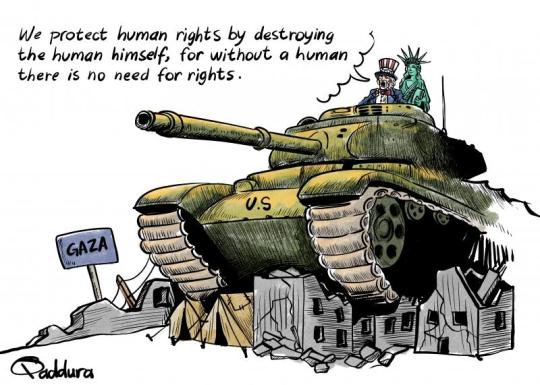
#US, #ISRAEL : Human Rights in #Gaza. Cartoon by Ahmad Qaddura:
#cartoon#caricature#GAZA#PALESTINE#USA#Ahmad Qaddura#humanrights#human rights#هند رجب#جامعة كولومبيا#hind rajab#genocide#gaza#student protest#college protests#harvard#BDS#WAR ON GAZA#free palestine#PALESTINE NEWS#UCLA#nyc#NYPD#friday#Good Friday#FREE#Israel#UNGA#TEL AVIV#jerusalem
135 notes
·
View notes
Text






স্বাস্থ্য ভবন। আজ।
12/9/24 ✊🏻
#justice delayed is justice denied#we want justice#justice#justice for rg kar#rg kar medical college#rgkarcollege#junior doctor#protests#college protests#revolution#west bengal#kolkata#saynotorape🚫#stoprape#rapeculture#tw r4p3#tumblrpost#tumblog#tumblr blog#desiblr#desi tumblr
51 notes
·
View notes
Text
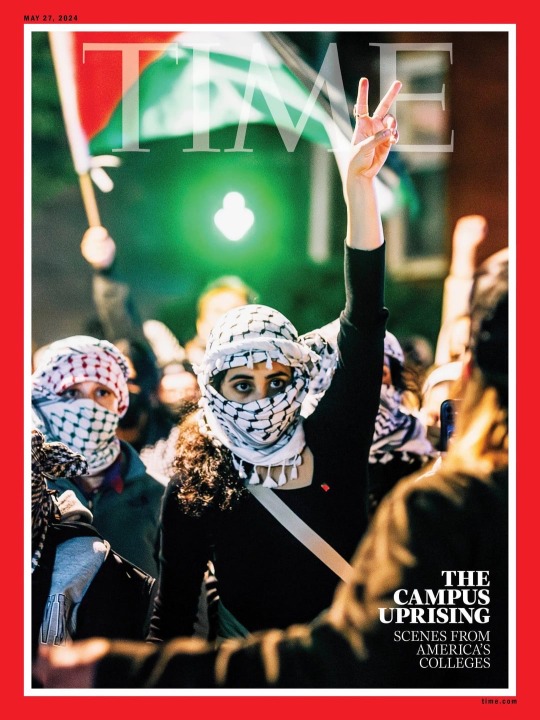
“I'm observing such a huge gap between different social groups that I didn't even realize were different. I, you know, most of my friends are in the media. A lot of my journalist friends are just much better informed.
A lot of them have had experience reporting in Israel, Palestine, and are quite critical of both Israel and the antisemitism narrative. Then, like, my wife is a lawyer, and her circle is a little bit different, right? It's not dominated by media people, like people in the law or in other professions seem to be broadly much more kind of taken by the sense of profound insecurity and shift in the American Jewish experience.
I think we sort of see different things, for example, when we watch the hearings in Congress on antisemitism on campus.
The university presidents, of which there have now been two hearings, one with three presidents, one with the president of Colombia, and there will be many, many more. And what I see is a right-wing campaign against higher education that is weaponizing antisemitism as an idea, right? Not antisemitism as a practice.
And what they see is, with the possible exception of the president of Colombia, is people who represent institutions or lead institutions that they feel an affinity with, often institutions that they graduated from, who are not standing up for them. Which I find that viewing of those hearings somewhat shocking because people seem to be turning off their critical faculties. But people, intelligent, educated, politically astute people don't turn off their critical faculties unless they're scared.
So I think the underlying fear is real. But just because it's real, it doesn't mean it's justified.
I think a factual account of what we're seeing on campuses now is that this generation of Americans is far more critical of Israel than their parents' generation. And this is true of both Jews and non-Jews. I think that they look at information available to them and they see a 57-year brutal illegal occupation.
And they don't understand how it's possible that their parents and the politicians that their parents support and the politicians who come and give commencement addresses and all that other stuff that I can say about politicians, how it is possible that these people support that state? I think that is an entirely understandable view. It also reflects a huge generation gap.
I think some of those young people are assholes, and some of them are antisemites. I think it's a small minority of the protesters, and it is not actually part of the critique. The protesters' demands, the protesters' organizing beliefs are not in any way or shape antisemitic.
And then there are Jewish students who were brought up Zionist, who were brought up to identify strongly with the state of Israel, who are, I think, a little bit like my cousin in the settlements again. They see these protests, and even probably the participation of their fellow Jewish students in these protests, as threatening their core identity, as threatening their ties to their families, as threatening everything that they were taught for the first 18 years of their lives is true. And of course they feel rattled, of course they feel unsettled, of course they feel threatened.
Like, wouldn't you, if you felt that everything you had believed in was being turned on its head, and if you, by apparently reasonable people? And so you have a couple of options. One is to look at what the protestors are saying, to engage with the facts, to engage with the critique of everything you've ever believed.
There was a terrific, George Curran's podcast a couple of weeks ago with three Columbia students, one of whom sort of narrated that kind of trajectory, getting to university and finding this stuff out and having their mind blown. That's a very difficult path, and it's a very difficult path, especially if you are, say, a first year student in 23, 24.
And then there's the easier path of staying integrated in your community, in your beliefs, and saying this is antisemitic.
Because unfortunately the things that the protestors are talking about are so horrible that you can't say, okay, let's agree to disagree, that you can't hold both of these things in your mind at the same time.
You can't continue to hold your family's uncritical, long-standing support of Israel, and an understanding of what is happening in Gaza and the occupation that has preceded the war in Gaza.
So yeah, of course they feel rattled. That doesn't mean that they're being surrounded by antisemitism.”
—Masha Gessen, the descendant of Holocaust survivors, discusses campus protests (part 3 of 3)
#politics#palestine#israel#masha gessen#student protests#campus protests#columbia university#anti zionism ≠ antisemitism#weaponized antisemitism#weaponized zionism#identity politics#idpol#ethnic cleansing#genocide#israel is a terrorist state#israel is an apartheid state#gaza#rafah#antisemitism#islamophobia#🇵🇸#college protests
538 notes
·
View notes
Text
Project 2025 is terrifying. But when the history books talk about this period, they will point to July 1, 2024, as the beginning of the Fascist Era in the United States.
That's the day SCOTUS ruled on the perfectly-named Trump v. United States, in which the Court said the president could not be prosecuted for crimes committed in office.
In the 11 days since, Biden and the Democrats have taken absolutely no action. That's because they are not an antifascist party. They will capitulate and capitulate until fascism is complete.
The media are playing this down as something that only applies to Trump. As something not especially dangerous. As something normal.
Protest, strikes, even "rioting" (a slur for direct action) are not failures of democracy, they are integral to it. The system has failed and will not replace itself. The People still have the power to make real, substantive change and create a society that is not just not-fascist but actively antifascist. And anticolonialist, antiracist, antisexist, genuinely democratic, and free.
Voting for Democrats AT BEST delays the inevitable furthering of fascism for a short while, and AT WORST actually accelerates fascism by empowering capitulators. Want to vote Biden? Fine, waste an hour of your time.
If you want to actually fight fascism, YOU HAVE TO FIGHT.
#general strike enthusiast#democrats are not antifascist#general strike#trump v united states#protests#campus protests#college protests#direct action#leftism#leftists#leftist#anti capitalism#anticapitalist#antifascism#antifascist#antifascist action#socialism#democratic socialism#anti capitalist#late stage capitalism#replace the constitution#vote 2024#vote blue#please vote#joe biden#vote biden#biden#project 2025
58 notes
·
View notes
Text
They let X happen, why are they doing Y?!
So this is an argument I see in some form in Leftist spaces regarding the response of college campuses to protestors in recent days. Often it's used as "Sure, they'll let neo-Nazis on campus with no problem, but the moment we have a peaceful protest they call the cops." Except here's the problem. It's not a peaceful protest. It's also not a one time thing like the neo-Nazis. Every campus I have ever worked at or attended has had neo-Nazis show up and march around. They were booed and counter-protested. They stood there grinning with their slogans, took their pictures, and then went on their way to post on the internet about how they "owned the libs". Neo-Nazis do not have a prolonged presence on campus and they do not protest weekly for 6 months straight at campuses across the country. Sometimes there's altercations and violence, and sometimes there's not. Usually it makes the news in some capacity and that's it. Compare this to the Western Activists who have been protesting since October. Many campuses have seen weekly, if not daily, protests where protestors have held signs supporting terrorist groups, justified the actions of 10/7, chanted antisemitic rhetoric, and engaged in a whole host of concerning activities that have continued to escalate in some way. This escalation has culminated in different ways across these campuses but has resulted in Jewish students being attacked, Jewish dorms and student centers being defaced, bomb threats, attempted arson, stabbings, and so on... All of which has now led to these same groups, whose members have committed the aforementioned actions in some capacity, to established encampments on their college campuses. Think about that. Your peaceful protests are more violent that neo-Nazis showing up to college campuses. That's why the police have been deployed. You can delude yourselves all you want, but there are clear incidents over the course of these 6 months that show why this is happening, and you have no one to blame but yourselves. We have told you since the beginning that you need to address the antisemitism and radicalization present in your movement, but instead you ignored Jews and claimed Zionists were using claims of antisemitism as a "weapon to silence criticism of Israel". Well, it turns out we were right and your movement is now regarded as a violently antisemitic one by the authorities. Instead of accepting this and correcting it, you have continued to blame Jews Zionists. I would not be surprised if we see this escalate further into violent protests with things like cocktails being thrown, and even then I know you will blame the Jews Zionists for your own actions. Take a step back, breath, and think. Your peaceful protests are more violent than neo-Nazi protests. A Jew should not be saying this. A Jew should not be going "hey, those neo-Nazis? Actually less violent than what's going on right now." It should not take a Jew to point out the sheer ridiculousness of this entire situation. That should be a red flag that something is very, very wrong.
#jumblr#leftist antisemitism#activism#israel#palestine#Columbia#College protests#neo-Nazis are more peaceful than these peaceful protestors
81 notes
·
View notes